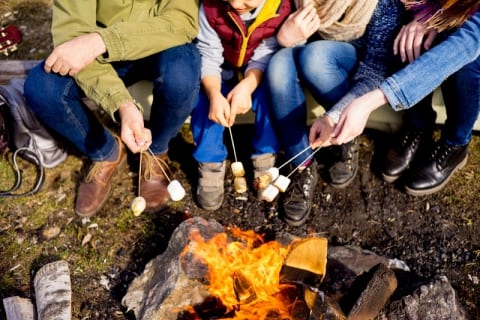Tips for Outdoor Camping and Campfire Safety
September 12, 2017

Outdoor camping season is quickly approaching (and in some areas, it’s already here!). Whether you’re a newcomer or a relatively seasoned veteran to the joys of sleeping under the stars, now is a good time to plan ahead with a checkup on campfire safety. Keep you and your family safe while camping by following these simple tips.
Campfire Safety Tips
1. Scout Out the Perimeter
When searching for a good place to start your campfire, don’t limit your view to the ground level. Look beyond that “perfect” spot you just found to make sure that it’s not close to any bushes, brush or low-hanging branches.
2. Clear It Out
While you might be camping somewhere that has a fire pit already present, it’s not likely to be ready for you to fire it up. Carefully assess the area in, around and near the fire pit. Clear away any debris, grass and garbage. Establish a five-foot perimeter of cleared area around your campfire.
Also circle your campfire with rocks to help keep it contained. Be alert to the presence of any items that could be flammable and keep them away from the fire. Don’t overlook aerosol cans or any other pressurized containers.
3. Keep Your Eye on the Prize
Of course, you’re camping to have a good time, but that doesn’t mean the fire can be forgotten. Even if you aren’t within a few feet of the fire at all times, make sure you designate a responsible adult to do so — and even take turns if necessary. Be especially watchful if there are pets and/or children in the vicinity since they can become easily excited or distracted.
4. Just Add Water
Because even the best precautions can’t account for every situation, be prepared with plenty of water to combat any sudden gusts of wind or wood that increase the size of your fire in unexpected ways. Arm yourself with a shovel as well. You can use both to control the fire if it starts getting out of hand or even to put it out completely.
5. Put Your Fire to Bed Before You Hit the Sack
When you’re winding down for the night, don’t forget to put the fire out, even if it appears to be slowly dying on its own. A sudden gust of wind could reignite it, or someone could inadvertently fall into it. While dousing the fire with water is your best option, you can also shovel some dirt on it if you run out of water. Make sure that you give the embers a good stir, and check that the coals are both cold and wet.
Roasting marshmallows over a campfire, snuggling by its dying embers, and cooking campfire meals are favorite pastimes can be safely enjoyed for lifelong memories with the right planning and care. Happy camping!
